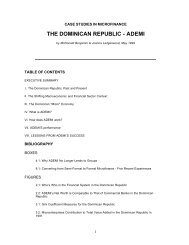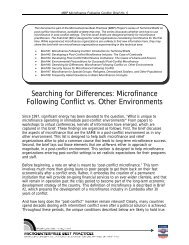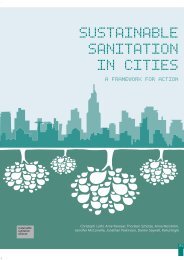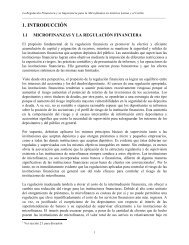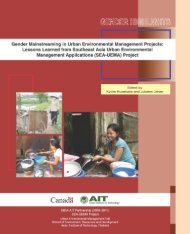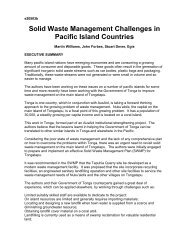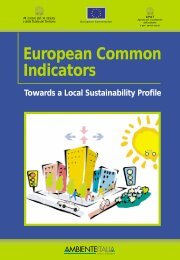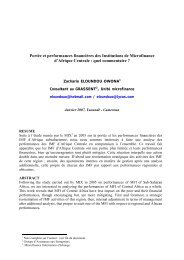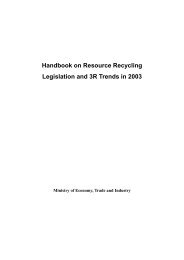The International Implementation Scheme (IIS) - Unesco
The International Implementation Scheme (IIS) - Unesco
The International Implementation Scheme (IIS) - Unesco
Create successful ePaper yourself
Turn your PDF publications into a flip-book with our unique Google optimized e-Paper software.
DESD <strong>International</strong> <strong>Implementation</strong> <strong>Scheme</strong> (<strong>IIS</strong>)<br />
produced by a growing number of developing countries. From the point of view of sustainable<br />
development, poverty reduction is the central concern of the economic element, but must be<br />
understood in relation to the other three elements: social, environmental and cultural. In other<br />
words, economic considerations, while key to sustainable development, are a contributing factor<br />
rather than an overarching goal.<br />
Corporate responsibility and accountability: the growth in the economic power and political<br />
influence of large corporations underlines their potential contribution to and effect on sustainable<br />
development. Issues of multilateral trade have immense implications for sustainable<br />
development, and ESD must build a balanced awareness of these economic and financial<br />
forces and enable learners to take action to increase public accountability and responsible<br />
commercial practices. <strong>The</strong> Global Compact, an international initiative of the UN Secretary<br />
General offers an existing framework for advancing responsible corporate citizenship, bringing<br />
companies together with UN agencies, labour and civil society to support principles in the areas<br />
of human rights, labour and the environment. 10<br />
Market economy: <strong>The</strong> global market economy as it currently exists does not protect the<br />
environment and does not benefit roughly half of the world’s people. One basic challenge is to<br />
create global governance systems that harmonize the market more effectively with<br />
environmental protection and the goal of equity. Furthermore, there is a need for advancing a<br />
revolution in technology that dramatically increases energy efficiency, the use of renewable<br />
energy sources, recycling and waste reduction. Education itself is part of a larger economic<br />
system and is influenced by patterns of supply and demand, by levels of taxation and other<br />
economic forces. It also functions in a particular regulatory environment. In order for ESD to find<br />
its place in educational offerings which respond to market forces, it will be important to influence<br />
regulations and the functioning of the market.<br />
3.4 Learning spaces<br />
ESD is for everyone, at whatever stage of life they find themselves. It takes place therefore<br />
within a perspective of lifelong learning, engaging all possible learning spaces, formal, nonformal<br />
and informal, from early childhood to adult life. <strong>The</strong> different parts of education systems<br />
including faith based institutions and learning opportunities outside of these systems have<br />
different functions with regard to ESD, but the aim is the same – to enable the learner to adopt<br />
practices and behaviours which foster sustainable development individually and collectively.<br />
ESD requires a re-examination of educational policy, in view of a re-orientation of education<br />
from nursery school to university and continuing adult learning, in order to focus clearly on the<br />
development of the knowledge, skills, perspectives and values related to sustainability. This<br />
implies a review of existing curricula in terms of their objectives and content to develop<br />
transdisciplinary understandings of social, economic, environmental and cultural sustainability. It<br />
also requires a review of recommended and mandated approaches to teaching, learning and<br />
assessment so that lifelong learning skills are fostered. <strong>The</strong>se include skills for creative and<br />
critical thinking, oral and written communication, collaboration and cooperation, conflict<br />
management, decision-making, problem-solving and planning, using appropriate ICTs, and<br />
practical citizenship. Education systems will need re-shaping so that this kind of learning is<br />
validated through the examination system and that teacher education prepares teachers for<br />
active/interactive learning processes, rather than a one-way transfer of knowledge.<br />
Learning of this kind can be undermined when it is unequally available to the whole population.<br />
Education systems which maintain a parallel private system available to the wealthier sections<br />
of the population are unlikely to convey the values of equity, dignity and respect which underpin<br />
sustainable development. This is particularly the case where the public system is held to be<br />
inferior. Similarly, public systems which rely on a parallel tutoring system, in which parents pay<br />
10 www.unglobalcompact.org<br />
22<br />
2005



